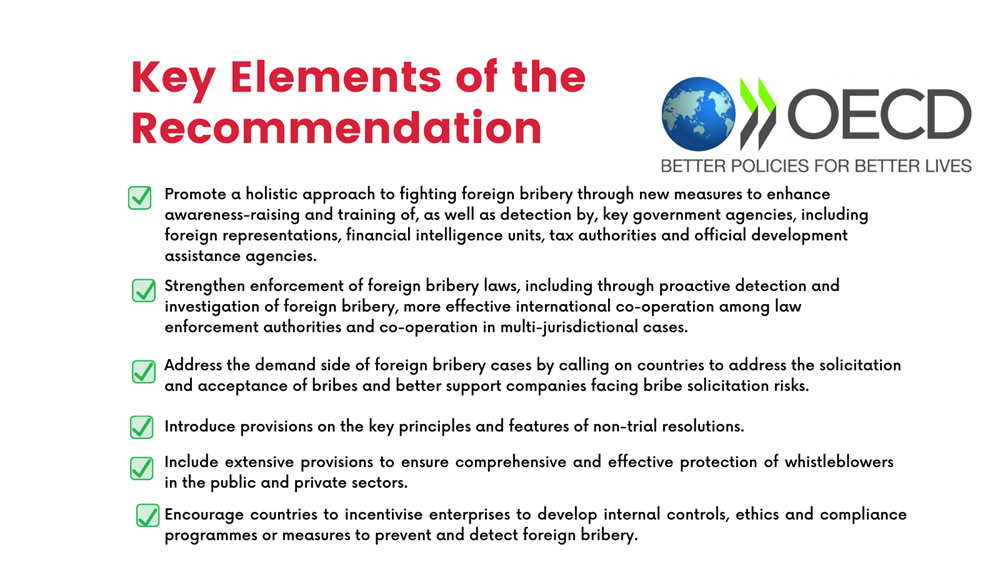Today the OECD (Organisation for Economic Cooperation and Development) launches a new international legal instrument to tackle bribery through a more global approach.
The OECD is an intergovernmental organisation that works to establish standards for a range of global challenges including corruption. Its 38 Members include the UK and the U.S.A. A further six countries are signatories of the original 1997 Anti-Bribery Convention - Argentina, Brazil, Bulgaria, Costa Rica, Peru, Russia and South Africa. The Convention is considered one of the most effective international anti-bribery instruments due to its mechanisms for review and improvement via an established Working Group.
Updated Recommendations for Further Combating Bribery of Foreign Officials were first adopted in 2009. The new revised 2021 Recommendation addresses current challenges, technological advances and good practices which have significantly evolved in the fight against corruption including significant provisions to strengthen the protection of persons reporting bribery - whistleblowers.
The 2009 update focused on strengthening the mechanisms for facilitating and investigating reports of bribery with the new revision on enhancing international cooperation of these mechanisms.
Read more: Recommendation of the Council for OECD Further Combating Bribery of Foreign Public Officials in International Business Transactions (2021 Anti-Bribery Recommendation). (also available in French.)
The new Recommendations include updated Good Practice Guidance on Internal Controls which encourages improved institutional safeguards to ensure that whistleblowers do not suffer retaliation. Whilst not binding, the Guidance is another persuasive lever to encourage private companies to take their responsibilities vis a vis whistleblowers seriously.

These are important provisions which follow several positive global developments in advancing employer standards this year; including new International ISO 37002 Guidelines on Management Systems and UN Principles for Responsible Investment on Effective Whistleblowing Systems. Updated guidelines are also anticipated from the International Chamber of Commerce shortly.
In the context of emerging international consensus on effective legal and institutional whistleblower protection, we are pleased to see the Recommendation and Guidance incorporating key principles for effective protection, such as diversified confidential reporting channels and effective and dissuasive sanctions for whistleblower retaliation, as well as acknowledging the role of anonymous whistleblowing. The Recommendations also mirror and complement key best practices enshrined in the landmark EU Directive on Whistleblowing (EU Dir 2019/137) including:
- Protecting a wide category of persons including connected third persons
- Protecting anonymous whistleblowers who are later identified
- Anti-gag (non-disclosure agreements) provisions
- Interim relief measures
- Provision of guidance and follow up to whistleblowers
- A reversed Burden of Proof (Read more here)
- Sufficient resources and training for competent authorities to handle disclosures
- Periodic review of the effectiveness of the framework
Read more: Are Whistleblowing laws working? A global study of whistleblower protection litigation
Whilst there have been massive leaps forward in the legal reform of dedicated whistleblowing protection legislation and international legal instruments such as, the EU Directive and the United National Conventions against Corruption, WIN continues to highlight and campaign for proper international cooperation in the protection of whistleblowers, which is sorely lacking in comparison to the investigation and enforcement of illicit and other wrongdoing - leaving whistleblowers unprotected in a globalised world.
The case of Whistleblower Jonathan Taylor - who yesterday was one of the winners of the 2021 Blueprint for Free Speech UK
Whistleblowing Prize - highlights the absurd situation of law enforcement authorities relying on a whistleblower’s disclosure in one jurisdiction, while allowing them to be pursued or legally harassed by the authorities in another.
Read more: UK whistleblower Jonathan Taylor finally freed from extradition torment almost one year on.
The newly revised Recommendation on Bribery and the Guidelines will now be reviewed every five years.
If you have any questions about the OECD guidelines or any other international instruments relating to the protection of whistleblowers, please get in touch with info@whistleblowingnetwork.org.